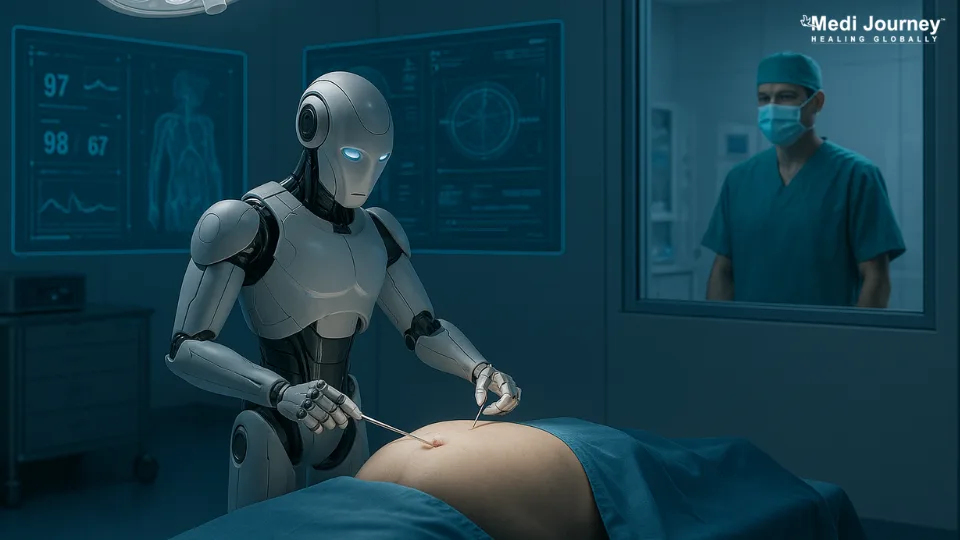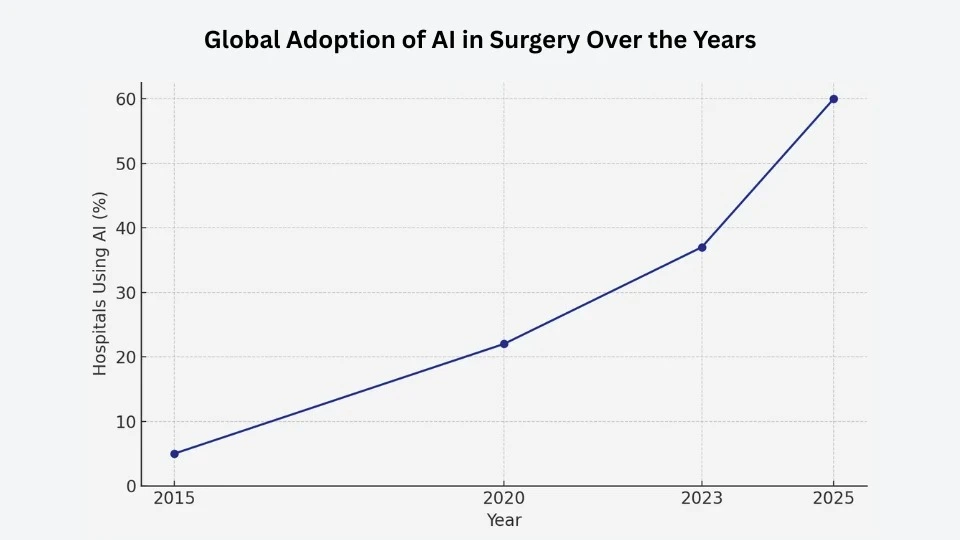Best Cosmetic & Plastic Surgeons in Indraprastha Apollo Hospital Delhi
 29 January,2026
Read More
29 January,2026
Read More
Enquire now in case of any assistance needed
 14 May,2025
14 May,2025

The operating room (OR) has long been a place of high stakes, demanding immense skill, precision, and experience. Artificial intelligence (AI) in the OR offers unprecedented advancements in surgical precision, efficiency, and patient outcomes.
As AI technologies become increasingly integrated into surgical practices, it's essential to understand their capabilities, limitations, and ethical considerations. AI can never replace a doctor when it comes to diagnosis and surgical understanding, but it can prove a worthy adjunct. Today, just like we find AI in everything, it has also entered medicine and surgery. Let us understand how relevant it is and how it is changing the current surgical landscape.
Fill up the form and get assured assitance within 24 hrs!
AI in the operating room isn't about replacing the surgeon with a robot (at least, not yet). Instead, it's about augmenting human capabilities, providing insights and assistance that were previously impossible.
Let us see how it can help achieve better results in surgery:
Artificial Intelligence (AI) in the OR spans various applications:

The above graph shows that the percentage of hospitals integrating AI in the OR has jumped from 5% in 2015 to a projected 60% by 2025, highlighting growing trust in its precision and potential.
Innovations in AI have led to the development of advanced surgical tools.
These technologies not only improve surgical outcomes but also contribute to reduced recovery times and lower complication rates.
The benefits of integrating Artificial Intelligence (AI) in the OR are compelling:
Despite the exciting potential, the integration of Artificial Intelligence (AI) in the OR isn't without its challenges and concerns:
Despite the benefits, integrating AI into surgical practices presents several challenges:
From a patient's perspective, the introduction of AI surgical systems offers several potential benefits while raising important questions about care quality and the human element.
Most patients view AI-assisted surgery as a way to improve precision and potentially reduce complications. The idea that AI can help surgeons make more accurate incisions, identify critical structures, or monitor vital signs in real time is reassuring. Patients often appreciate that AI might catch issues a human surgeon could miss, especially during long procedures when fatigue might be a factor.
However, many patients express concern about losing the human touch in their surgical care. They worry about who is ultimately responsible if something goes wrong—the surgeon or the technology? This uncertainty can create anxiety about accountability and recourse.
Trust is another major consideration. Patients want to know that AI systems have been thoroughly tested and proven safe before being used in their procedures. They often ask about the evidence supporting AI systems and what safeguards are in place.
Communication about AI's role in surgery is crucial for patient comfort. Most patients prefer knowing exactly how AI will be used in their procedure, what aspects remain fully under human control, and what the surgeon's experience is with the technology.
The integration of Artificial Intelligence (AI) in the OR is still in its relatively early stages, but its trajectory is clear. We will likely see increasingly sophisticated AI applications moving towards more autonomous tasks in highly controlled environments under strict supervision.
The future of surgery is shining bright with the wonderful blend of human expertise and AI capabilities. AI brings fantastic tools that can boost decision-making and improve procedural accuracy, but it's the surgeon's judgment, experience, and empathy that genuinely make a difference and can’t be replaced. Focusing on teamwork, thorough testing of AI systems, and ongoing education for our medical professionals is essential to unlock AI's full potential in the operating room.
MediJourney can help you understand the nuances in medicine and surgical procedures. If you or your family is looking for medical treatment options abroad, contact us today. We will be your partner during both the difficult and the good times.
Fill up the form and get assured assitance within 24 hrs!
B.Sc in Media Science from NSHM Knowledge Campus, Kolkata, 2019-2022
Suryani Dutta is an experienced content writer, specializing in healthcare and medical tourism. With a B.Sc. in Media Science from NSHM Knowledge Campus, Kolkata, she creates engaging, accurate, and SEO-friendly content that empowers patients to make info
Director
Orthopedic and Joint Replacement Surgeon
Dr. Sanjay Gupta is an experienced Orthopedics & Joint Replacement Surgeon specializing in various orthopedic procedures, including performing over 10,000 Joint Replacement Surgeries....
Senior Consultant
Medical Oncologist
Nanavati Super Specialty Hospital, Mumbai
WhatsApp UsSenior Director
Gynecologist and Obstetrician, IVF Specialist
Max Super Speciality Hospital, Shalimar Bagh, New Delhi
WhatsApp UsSenior Director
Gynecologist and Obstetrician, IVF Specialist
Max Smart Super Speciality Hospital, Saket, New Delhi
WhatsApp UsSenior Director
Gynecologist and Obstetrician
Max Smart Super Speciality Hospital, Saket, New Delhi
WhatsApp UsSenior Director
Gynecologist and Obstetrician
Max Smart Super Speciality Hospital, Saket, New Delhi
WhatsApp UsSenior Director
Gynecologist and Obstetrician
Max Smart Super Speciality Hospital, Saket, New Delhi
WhatsApp UsThe Art of Effective Communication
 27 January,2026
Read More
27 January,2026
Read More
 20 January,2026
Read More
20 January,2026
Read More
 16 January,2026
Read More
16 January,2026
Read More
 13 January,2026
Read More
13 January,2026
Read More
 09 January,2026
Read More
09 January,2026
Read More
Trusted by Patients
"I am Asim from Bangladesh and was looking for treatment in India for neuro. I visited many websites to get the complete information regarding the treatment but I was not satisfied as I was getting confused. In the meanwhile, one of my friends suggested I seek help from Medi Journey as he experienced his medical journey very smoothly and was satisfied with it. They have filtered the top 10 doctors as per experience, the success rate of surgery & profile, so it helps us to choose the best treatment in India. "
"For my knee surgery, Medi Journey guided me to BLK Hospital where I received exceptional care. The team's support and the expertise at BLK Hospital exceeded my expectations. Thank you Medi Journey for making my medical journey stress-free. "
"I came from Iraq for my granddaughter's eye surgery in India facilitated by Medi Journey, due to critical cases they advised us to get a second opinion from the different hospitals before going to surgery. Finally, we went to Fortis Escort Hospital, which helped us to get more confidence for diagnosis. Fortis Escort Hospital has the best eye surgeon team with the latest instruments. Thanks to all team members for providing a high-quality treatment in India at an affordable cost. "
"I came for my hair transplant in India, before coming I was so confused about choosing the best clinic and surgeon for me. But thanks to God one of my friends had a hair transplant in India through Medi Journey. He recommended me to go with them. I am completely happy with my experience with them. They were always very fast in their responses to me. the success rate of my hair transplant surgery is 100%."
"Artemis Hospital, suggested by Medi Journey, turned out to be a great choice for my treatment. The personalized assistance and medical care were exceptional. I'm grateful to Medi Journey for guiding me to a hospital that perfectly matched my needs. Highly recommended! "
"I came from Afghanistan for my treatment in India at Jaypee Hospital, Noida. I had a fantastic experience with Medi Journey. Kudos to them for their incredible support during my medical journey. They not only took care of all the logistics but also connected me with a fantastic healthcare team. Efficient, caring, and highly recommended for a hassle-free medical tourism experience."
"I am Adam from Kano, Nigeria, one of my friends from Nigeria was facilitated by Medi Journey, and he recommended us to go with them. I sent my all reports to them and within 48 hours they reverted with 4 options from different hospitals. They helped me to get a Visa letter from the hospital, arrange pick-up from the airport, and book a hotel for me. Their team is very honest and throughout our stay in India they are with us they are caring for us like his family members. BLK Hospital is the best hospital in India with a top surgical oncologist surgeon team, a very advanced OT, and a Radiotherapy department. I wish more success to Medi Journey. "
"Great experience at the Max Hospital for my spine surgery and was successfully done. I thank my neurosurgeon and his entire team. I recommended all of my country's people to Medi Journey for treatment in India, they choose the best hospital, the best doctors, and the best cost for patients."
"I came to India from Dhaka, Bangladesh for my father-in-law's cardiac surgery at Fortis Hospital. I was confused about choosing the best surgeon for him before coming, but their team helped me to choose the best hospital and best cardiac surgeon in India with very good cost and 100% success rate of surgery. I am very happy with the services, really they make my journey so comfortable that make me feel at home. Thanks again and I like people to choose "Medi Journey" as your travel guide. "
"I am Mohammad from Bangladesh came to India for my general health checkup. Medi Journey offers me the complete package including Pick-up from the airport, hotel services, and 24-hour assistance. They guide you to choose the best hospital in India, the best cost of treatment with top-most doctors and give you complete information about hotel booking, and pick-up from the airport before coming to India They have the best team to help. Always choose Medi Journey for your treatment in India."





